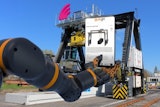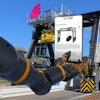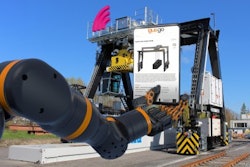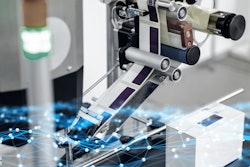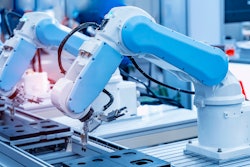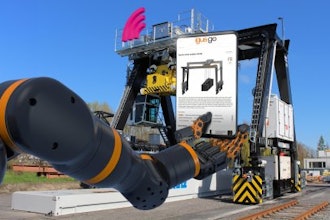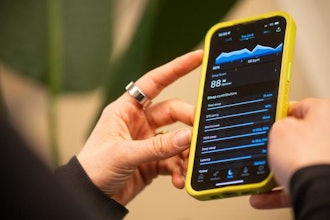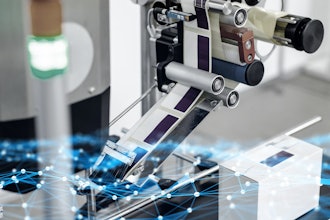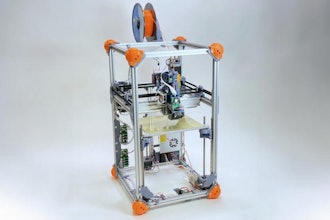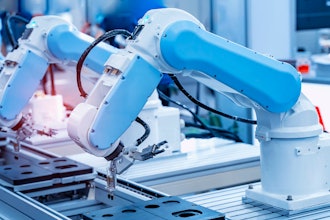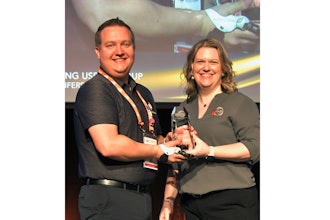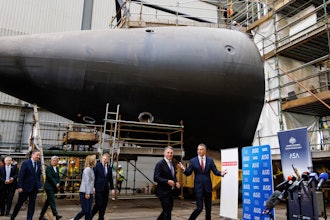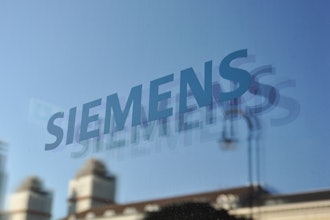Digital, autonomous and intelligent technologies are transforming global manufacturing.
The industry-led Made Smarter review, chaired by Siemens Chief Executive Juergen Maier, stated that industrial digitalization could be worth as much as £455 billion ($601 billion) to United Kingdom manufacturing over the next decade.
Embracing digital capabilities to transform industries across the UK economy was emphasized in the government's modern Industrial Strategy, with artificial intelligence (AI) being one of the Grand Challenges, in which the UK could lead the world in years to come. In the recently published Artificial Intelligence Sector Deal, it was confirmed that AI has the potential to solve complex problems fast, and in so doing, free up time and raise productivity.
The Engineering and Physical Sciences Research Council (EPSRC) has awarded £11.4 million ($15 million) to seven projects which aim to create novel digital tools, techniques and processes that will support the translation of digital capabilities into the manufacturing sector. This activity was led by EPSRC's Manufacturing the Future and Digital Economy themes.
This investment marks the continuation of EPSRC's longstanding commitment to foster inter and multi-disciplinary collaboration and support business innovation via digital transformation. It arose out of work conducted by the Connected Everything Network Plus, which was established to create a multidisciplinary community focused on industrial systems in the digital age.
Working with a wide range of industrial partners, the projects will tackle different challenges in this space, including the improvement of processes in the chemical and pharmaceutical industries; developing methods to capture and predict impact from the introduction of digital technologies for improved manufacturing performance; the integration of revision control in digital-physical models; the improvement of modelling for analysis of dynamic loading in engineering and manufacturing; and the development of low-cost digital tools for SMEs.
EPSRC's Executive Chair, Professor Philip Nelson, said: "The adoption of advanced ICT techniques in manufacturing provides an enormous opportunity to improve growth and productivity within the UK. The effective implementation of these new technologies requires a multidisciplinary approach and these projects will see academic researchers working with a large number of industrial partners to fully harness their potential, which could generate impact across many sectors."
Summaries of the projects:
Cognitive Chemical Manufacturing - EP/R032807/1
Led by: Dr Richard Bourne, University of Leeds
Partners: University of Nottingham, UCL, AstraZeneca plc, IBM UK Ltd, Promethean Particles Ltd, Swagelok Manchester
Grant: £1.9 million
The project will utilise the combined assets and know-how of the universities and project partners to develop new algorithms for the machine learning-based generation of chemical process design knowledge, coupling the algorithms to a cyber platform for automated experimentation. The combined cyber-physical system will be designed to minimize the time it takes to identify safe and robust chemical manufacturing processes, and will be validated via in-depth case studies related to current manufacturing challenges faced by project partners.
Digital Toolkit for optimisation of operators and technology in manufacturing partnerships (DigiTOP) - EP/R032718/1
Led by: Professor Sarah Sharples, University of Nottingham
Partners: Loughborough University, Cranfield University, University of the West of England, BAE Systems, Babcock International, Synertial Labs Ltd, Artinis Medical Systems B.V., High Value Manufacturing (HVM) Catapult, Jaguar Land Rover Ltd
Grant: £1.9 million
DigiTOP will look to deliver an open-access suite of digital tools to enable the real-time capture and prediction of impact, allowing digital technologies to be optimized for manufacturing system performance. Using new human factors theories and data analytics approaches, tools will be designed to inform human requirements for workload, situation awareness and decision making in digital manufacturing. At the same time, demonstrators will be used to test the implementation of sensing technologies that will capture and evaluate performance change and build predictive models of system performance. The project will also provide an understanding of the ethical, organisational and social impact of the introduction of digital manufacturing tools and digital sensor-based tools to evaluate work performance in the future workplace.
Improving the product development process through integrated revision control and twinning of digital-physical models during prototyping - EP/R032696/1
Led by: Professor Ben Hicks, University of Bristol
Partners: Designability, Altuity Solutions Ltd, Amalgam, Autodesk Ltd (UK), Renishaw plc, The Moulton Bicycle Company
Grant: £1.6 million
The lack of revision control in twinning of physical-digital model leads to multiple near-identical model instances, which contribute to issues of process management, traceability, decision making, design duplication and inefficiency, and design rationale capture. It also makes optimisation of the product development process in terms of the digital-physical tool-chain all but impossible. The project will fundamentally redefine the revision control and twinning processes for digital and physical models from a manual, cumbersome, error prone and expensive procedure to one that is seamlessly integrated (digital-to-physical and physical-to-digital), rapid, reliable and knowledge rich.
ARTICULAR: ARtificial inTelligence for Integrated ICT-enabled pharmaceUticaL mAnufactuRing - EP/R032858/1
Led by: Dr Blair Johnston, University of Strathclyde
Partners: Loughborough University, Glasgow School of Art, Arcinova, Booth Welsh, Cambridge Crystallographic Data Centre, Siemens plc, DAQRI, Perceptive Engineering Ltd
Grant: £1.9 million
This project will seek to develop novel machine learning approaches to learn from past and present manufacturing data, and create new knowledge that aids in crucial manufacturing decisions such as knowing the processes and operations to employ; the sensors and measurements to deploy to optimally deliver the product; and the potential process upsets and their future impact on the quality of the medicine manufactured. All of these data and the Artificial Intelligence (AI) 'learning' will be made available via bespoke, personalisable Augmented Reality and Virtual Reality interfaces.
SYstems Science-based design and manufacturing of DYnamic MATerials and Structures (SYSDYMATS) - EP/R032793/1
Led by: Professor Zi-Qiang Lang, University of Sheffield
Partners: Imperial College London, University of Derby, University of Bristol, Rolls-Royce plc, MSC Software Ltd, TISICS Ltd, Carter Manufacturing Ltd, Thomas Swan and Co Ltd, Wilson Benesch Ltd, MS Research Treatment and Education
Grant: £1.6 million
Materials and structures in many engineering systems are often subject to dynamic loads, which place challenging constraints and requirements on their design and manufacturing. One of the main challenges in modelling these systems is how to produce a high-fidelity reduced order model and conduct the reduced order model-based design for engineering materials and systems that need to withstand demanding dynamic loads. This project will develop an innovative digital manufacturing methodology based on the complex systems science and demonstrate the effectiveness and significance of the novel method in three case studies.
Digital Manufacturing on a Shoestring [Digital Shoestring] - EP/R032777/1
Led by: Professor Duncan McFarlane, University of Cambridge
Partners: University of Nottingham, Atos Origin IT Services UK Ltd, BTL Precision, EEF, Greater Manchester Chamber of Commerce, High Value Manufacturing (HVM) Catapult, Manufacturing Technologies Association, Nottinghamshire Manufacturing Network
Grant: £1.6 million
This project will address a common concern that recent developments in digital manufacturing are unlikely to be accessible by SMEs owing to the associated capital cost of upgrading industrial computing and communication environments. It proposes a radically different approach to the digital evolution of a manufacturing operation by focusing predominantly on non-industrial solutions to industrial automation and information challenges. It will seek to exploit very low cost commercially available technologies for mobile computing, sensing, AI and tackle the challenges associated with integrating these safely and securely into a small scale manufacturing environment.
Circular4.0: Data Driven Intelligence for a Circular Economy - EP/R032041/1
Led by: Dr Fiona Charnley, Cranfield University
Partners: University of Sheffield, Airbus Group Ltd, Ellen Macarthur Foundation, Manufacturing Technology Centre, RiverSimple, Rolls-Royce plc
Grant: £775,000
Moving to a Circular Economy, where resources are kept in use for as long as possible before products and materials are recovered and reused at the end of each service life, could benefit UK businesses by as much as £23 billion a year. The project aims to identify how data from products in use can inform intelligent decisions surrounding the implementation of Circular Economy strategies in order to accelerate the implementation of circular approaches to resource use within UK manufacturing. It aims to develop new knowledge, tool and methodologies which will allow organisations to capture data throughout the lifecycle of their products and make informed decisions on the most appropriate Circular Economy strategy.
